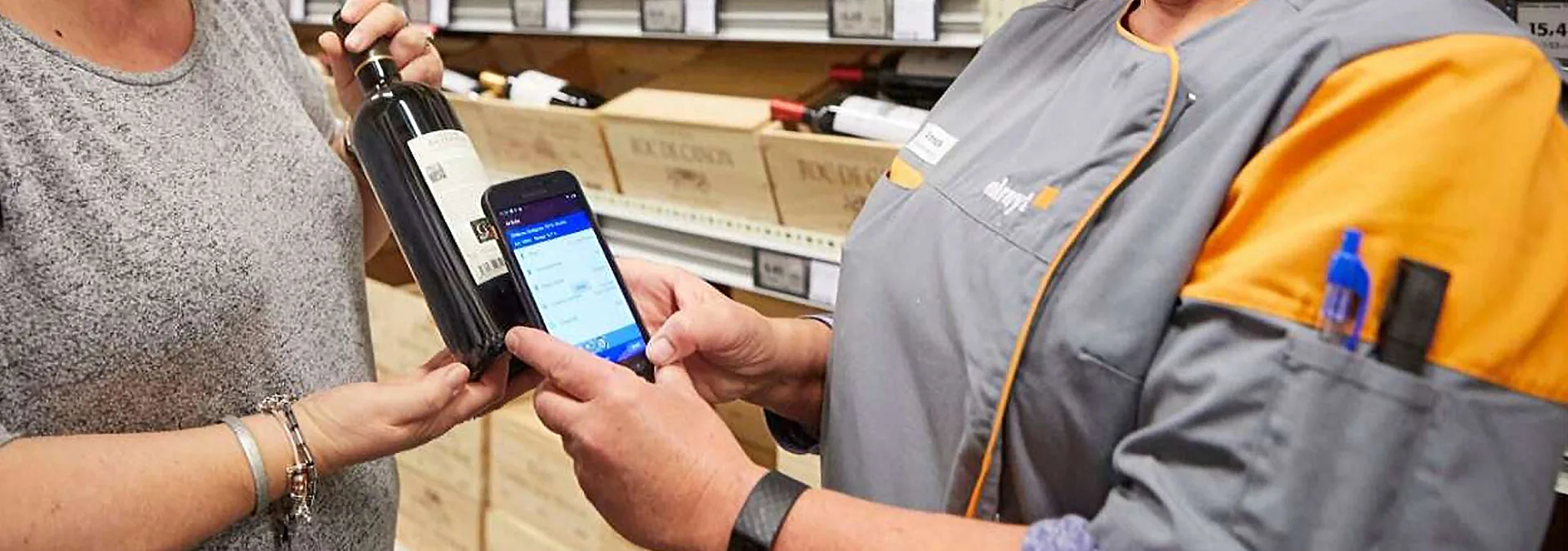
技术
- 平台即服务 (PaaS) - 应用开发平台
- 传感器 - 条码阅读器
适用行业
- 消费品
- 零售
适用功能
- 产品研发
用例
- 库存管理
- 零售店自动化
服务
- 系统集成
客户
科鲁伊特
关于客户
Colruyt是比利时最大的零售集团,是在其超市部署商店运营技术的创新者。
挑战
Colruyt 希望通过创建“知情和互联的商店员工”来投资其数字化未来,并发展成为一个面向未来的技术平台。
他们决定用个人消费设备代替共享的专用扫描设备,这样店员可以轻松操作并始终保持联系。该公司探索了具有快速、基于摄像头的扫描功能的智能手机,该扫描支持现有专用设备中使用的流程。
为了支持他们为员工提供基于智能手机的数据采集解决方案的计划,Colruyt 想要一个合作伙伴:
- 提供卓越的基于软件的条码扫描。
- 分享了他们对支持未来创新的平台的愿景。
- 易于与其应用程序套件集成,并支持多种框架和移动架构。
解决方案
该公司与三星合作,为员工提供由 Scandit 条码扫描解决方案提供支持的公司自有 (COBO) Galaxy XCover 4S 智能手机。
在使用 700 部 Scandit 驱动的智能手机进行的试点中,Colruyt 发现 Scandit 的条码扫描器速度快、成本效益高,并且易于集成到他们的应用程序套件中,提供一维和二维(QR 码)条码的高性能扫描。
Colruyt 选择 Scandit 作为在各种参数上超越竞争对手的解决方案,包括:
- 一台设备,多项商店任务:员工使用基于 Scandit 的智能手机进行众多商店运营。
- 创新:面向未来的创新平台,具有企业级条码扫描功能,以及基于计算机视觉技术的附加功能。
- 高性能:即使在弱光、眩光和损坏的条码下,也能通过耐用的三星智能手机获得无与伦比的扫描精度。
- 无处不在: Scandit 在帮助大型杂货企业转型和优化店内运营方面拥有丰富的零售经验。
运营影响
数量效益

Case Study missing?
Start adding your own!
Register with your work email and create a new case study profile for your business.
相关案例.
.png)
Case Study
Improving Vending Machine Profitability with the Internet of Things (IoT)
The vending industry is undergoing a sea change, taking advantage of new technologies to go beyond just delivering snacks to creating a new retail location. Intelligent vending machines can be found in many public locations as well as company facilities, selling different types of goods and services, including even computer accessories, gold bars, tickets, and office supplies. With increasing sophistication, they may also provide time- and location-based data pertaining to sales, inventory, and customer preferences. But at the end of the day, vending machine operators know greater profitability is driven by higher sales and lower operating costs.

Case Study
Improving Production Line Efficiency with Ethernet Micro RTU Controller
Moxa was asked to provide a connectivity solution for one of the world's leading cosmetics companies. This multinational corporation, with retail presence in 130 countries, 23 global braches, and over 66,000 employees, sought to improve the efficiency of their production process by migrating from manual monitoring to an automatic productivity monitoring system. The production line was being monitored by ABB Real-TPI, a factory information system that offers data collection and analysis to improve plant efficiency. Due to software limitations, the customer needed an OPC server and a corresponding I/O solution to collect data from additional sensor devices for the Real-TPI system. The goal is to enable the factory information system to more thoroughly collect data from every corner of the production line. This will improve its ability to measure Overall Equipment Effectiveness (OEE) and translate into increased production efficiencies. System Requirements • Instant status updates while still consuming minimal bandwidth to relieve strain on limited factory networks • Interoperable with ABB Real-TPI • Small form factor appropriate for deployment where space is scarce • Remote software management and configuration to simplify operations

Case Study
How Sirqul’s IoT Platform is Crafting Carrefour’s New In-Store Experiences
Carrefour Taiwan’s goal is to be completely digital by end of 2018. Out-dated manual methods for analysis and assumptions limited Carrefour’s ability to change the customer experience and were void of real-time decision-making capabilities. Rather than relying solely on sales data, assumptions, and disparate systems, Carrefour Taiwan’s CEO led an initiative to find a connected IoT solution that could give the team the ability to make real-time changes and more informed decisions. Prior to implementing, Carrefour struggled to address their conversion rates and did not have the proper insights into the customer decision-making process nor how to make an immediate impact without losing customer confidence.

Case Study
Digital Retail Security Solutions
Sennco wanted to help its retail customers increase sales and profits by developing an innovative alarm system as opposed to conventional connected alarms that are permanently tethered to display products. These traditional security systems were cumbersome and intrusive to the customer shopping experience. Additionally, they provided no useful data or analytics.








